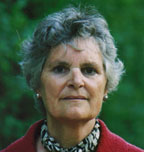
The Seattle Times, Sunday, October 31, 2004
Mexico's Day of Dead Inspires a Personal Ritual
©2004 Valerie Kreutzer
We’ll do it again this year. Around all Souls Day, we’ll spread a blanket at our children’s graves in Florida for a picnic and invite the extended family.
The idea for this commemoration was born two years ago when I observed dia de los muertos (day of the dead) celebrations in Mexico. Friends had invited me to join their outing to the state of Michoacan where, according to the locals, the veil between the living and the dead is especially thin and briefly lifts during the night of November 1 to welcome the dead home.
Airplanes, buses and a car had brought me to the cemetery of Tzintzuntzan, a village named after the sound made by hummingbirds. As dusk settled, we mingled with the pilgrims from all over Mexico and the United States who had come to honor their dead. Millions of candles illuminated mountains of marigolds on graves where families had gathered.
I settled next to a grandmother and her offspring. “My husband,” she said, pointing to the cross that listed 1976 as the year of his death. Her youngest grandchild busily re-lit candles blown out by the evening breeze.
“De donde esta (where are you from),” asked her older brother.
“Seattle,” I said.
“WA-SHING-TON!” he exclaimed. The whole family, it turned out, had once lived in Everett. Now they’re back in Tzintzuntzan.
The boy and his siblings never met their grandfather, I realized Yet in an all-night vigil they honored an ancestor who had supplied part of their DNA. As I moved among the graves and families I felt deeply touched by the outpouring of love that surrounded me.
“This is my son,” said an old man, pointing to a photo at the head of the grave showing a man in a business suit. The father and a dozen relatives were settling in for a long, cold night, huddled in blankets. Covered dishes with favorite foods sat on the grave, a bottle of tequila at its center.
Islands of light around Lake Patzcuaro signaled dozens of villages where people gathered in communal commemoration. Their celebrations were somber yet cheerful and so different from the brief visits I had made to my daughter’s grave in Florida. My Maria had recently died in a car crash. How much easier it would be, I realized, to sit by her grave surrounded by an extended family, welcoming her spirit into our midst.
Mexicans also invite the dead into their homes we discovered on a tour of stately colonial mansions in Patzcuaro, the state’s capital. Every home had an ofrenda (altar) to the family’s dead loved ones. Ofrendas were decorated with flowers, candles, photos of the departed and their favorite food and drink. Candy skulls and skeletons added whimsy to the displays, transforming death from a cult into a macabre and often humorous spectacle.
That honky-tonk spirit also prevailed in the areas adjacent to the larger cemeteries. Drummers drummed, bands screeched, and dancers danced with abandon. We drifted with the crowds and breathed the aroma of intoxication. We ate chunks of the sweet day of the dead bread, had a beer and then moved on.
In Cucuchuchu, a poor farming village of two thousand, I settled next to a man and woman who faced each other across a grave. “My wife,” said the man pointing to the grave. “She was my best friend,” added the woman, now his wife. “She is not dead,” explained the man, “she is just asleep.”
He voiced the deep-seated belief that death isn’t final as long as someone remembers you. Leaving the scene at three in the morning I wondered how to transplant some of my experiences to Florida where Maria is buried next to David, her boyfriend. He drove the car in the fatal crash.
Could we assemble the extended family for a picnic? Of course, said David’s parents. On so, on the second anniversary of our children’s death we took roses and candles to their graves in Zephyrhills, spread a blanket, had Maria’s favorite cookies, and shared memories of our children. We cried and laughed a little and when we walked away, we had the feeling that Maria and David would have liked the party.
We decided to make it an annual event.
